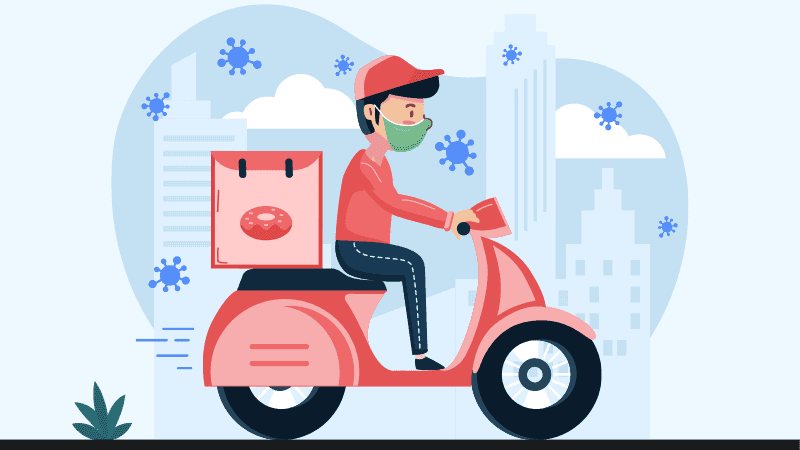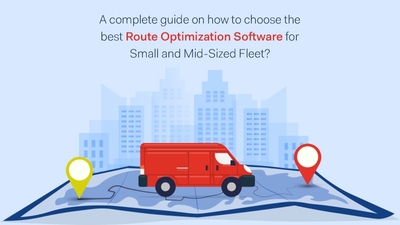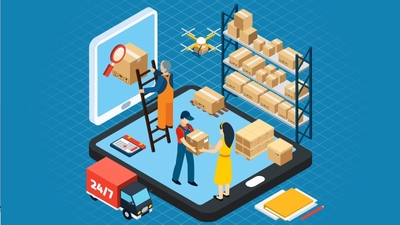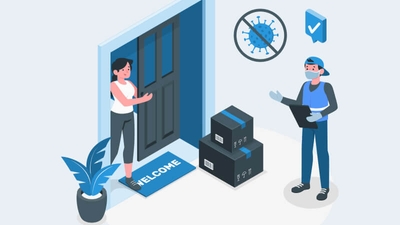Since the outbreak of the novel coronavirus, we’ve been instructed to stay inside and to reduce human contact. One of the biggest challenges is making food. Many states and cities have limited restaurants to takeout since dining out is no longer considered safe or responsible. But, ordering delivery is still a viable option. You can opt for on-demand food delivery services to get food on your doorsteps.

There is little proof to support that COVID-19, the disease caused by the novel coronavirus, can be spread from food or food packaging, according to the Centers for Disease Control and Prevention and the Food and Drug Administration (although, of course, nobody is completely sure). But, the risk can be much more crucial for delivery workers who have to travel and communicate with people.
This risk is perhaps one of the major challenges faced by food delivery companies during this time of the pandemic.
Top 8 practices to follow for real time delivery tracking apps
Here are a few popular good practices for real time delivery tracking apps — both in terms of health and ethics — for getting takeout:
Practice social distancing
Avoid contacting the food courier in person. Order from the best online food delivery app. Some apps have added options to help limit in-person contact. Instacart rolled out a “Move at My Door Delivery” option and Postmates have also started giving no-contact deliveries. Grubhub has a contact-free delivery choice, which allows you to choose where the food should be left.
If those options aren’t available at your preferred takeout place, you can always ask (in the delivery instructions or over the phone) to have the food dropped on your doorstep, in the entryway, or somewhere else.
Even after taking all the precautions, if you still have doubts then you can wash your hands with a cleanser and water for a minimum of 20 seconds.

Throw out the packaging
The CDC says that there is a chance of getting the virus by coming into connection with a surface that has the virus on it. That’s why it’s most beneficial if you cut the packaging as your order comes in as soon as possible and wash your hands right after.
Also, it’s probably good practice to avoid using the vessels and utensils that the food came in (some tests indicate that the virus could possibly remain viable on cardboard for up to 24 hours and on plastic for up to three days) and use your own rather. And it’s always a good idea for any last mile delivery solution service to clean your counters and stands before and after eating.
Tip well
Delivery workers are particularly vulnerable to the virus, and they rely on that work for their living. It’s great that you tip, and if you are ready to, tip graciously. A 20 per cent tip is usually the standard. Now, it’s a good idea to tip even more extra (if you can), particularly if you have a large order or have ordered a drink as well. Also, tip electronically, by online, in the app, or over the phone.
Avoid, if possible, giving the tip in cash as that involves contact with another person. If you definitely have to use cash, wash your hands after handling it. If you’re packing out a receipt, use your own pen and later wash your hands after.
Read More: Significance of route optimization software for pharmacy delivery.
Support local business
It’s better to establish a local or family-owned business because they are more likely to be hit harder by the effects of quarantine measures. Chinese restaurants have been trying in particular, after misinformation and bias led people to hate eating Chinese food. A smaller business also presumably means that the workers are also coming into contact with fewer people.
Order directly from the restaurant, if possible
It is always better to order right from the restaurant, as third-party apps can carry commission fees. Some of these delivery services have also been involved in unsavory practices. Grubhub, Seamless, and DoorDash were all found to be listed on their sites and apps companies that they didn’t partner with.
Grubhub was also found setting up dummy websites to look like they come from local companies, allegedly in order to prevent their orders and then charge those businesses a higher commission. That’s why it’s essential to verify the contact information by running multiple searches and cross-checking the information on Yellow Pages, Whitepages, or the Better Business Bureau.
GrubHub is also having restaurants include the costs of their $10 discount, as well as getting those restaurants to pay the same commission they would on a full-price order. Restaurants have to opt into this plan but to opt out they need to send in a form for each area, and there’s a two-day processing time.

If you’re using an app
If you have to order from a real time delivery tracking app but want to buy ethically, give your focus to that particular service’s sick leave and benefits plan for their employees. Postmates has set up a relief fund to help meet employee’s medical costs related to the pandemic. It will also give two weeks of paid sick leave if an employee tests positive for COVID-19.
Instacart and DoorDash give up to two weeks’ pay if a worker is placed under mandatory quarantine or diagnosed. Originally, Instacart’s policy was only valid up to 30 days after March 9th, but they’ve since continued it through May 8th. Instacart also allows all in-store customers to accrue sick leave. UberEats provides financial support to delivery boys and employees who may be affected or exposed to the virus for up to 14 days.
Eater has announced a list of food chains offering paid sick leave. Keep in mind that sick leave only refers to employees who tested positive for COVID-19 — these policies don’t cover provisions for employees who have symptoms but weren’t able to get tested. Many companies have been criticized for failing to sufficiently protect workers during the outbreak.
Instacart workers went on hit on March 30th, asking for the company to increase its paid sick leave policy, add a $5 hazard payment for each order, and give workers protective supplies such as hand sanitizer and disinfectant wipes. Workers at Amazon and Whole Foods also went on strike to protest how their companies have managed the coronavirus outbreak.
Read More: Route Optimization Enhances Last Mile Delivery Operations
Some apps are taking actions to help small businesses in the wake of the pandemic. Postmates has waived delivery fees for companies in the Bay Area. Grubhub has deferred commission fees for some independent restaurants. Uber Eats is waiving delivery fees for independent businesses and giving 300,000 free meals to first responders and health care workers in the US and Canada.
Leave a good rating
Gig workers’ reviews are often judged by their ratings, which can have an influence on whether they get work, so it’s helpful to leave a good rating and leave a real review for your restaurant. It’s taking a hit these times, and if you want it to remain in business, a good review can make a difference.
You can totally rely upon branded food and beverage delivery solutions in this crisis. We have intelligent food delivery software which will fulfill all your daily needs. Industries impacted by the coronavirus are suffering from a huge loss and on the contrary, people are also striving for daily needs.
When we are there with you, you don’t have to worry about your needs, as we are the best food delivery app development company, designing food based last mile delivery solution apps for your phone.




